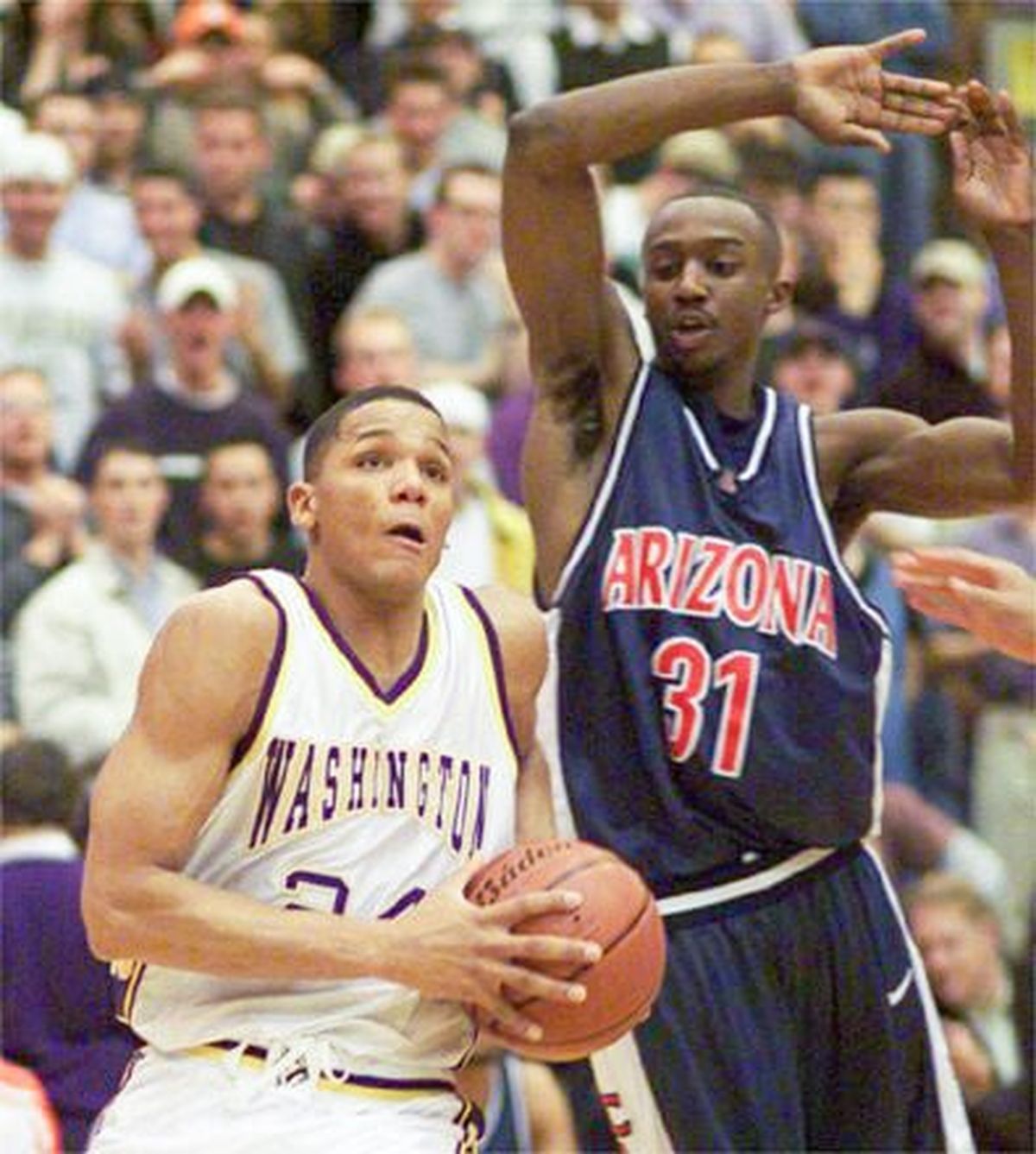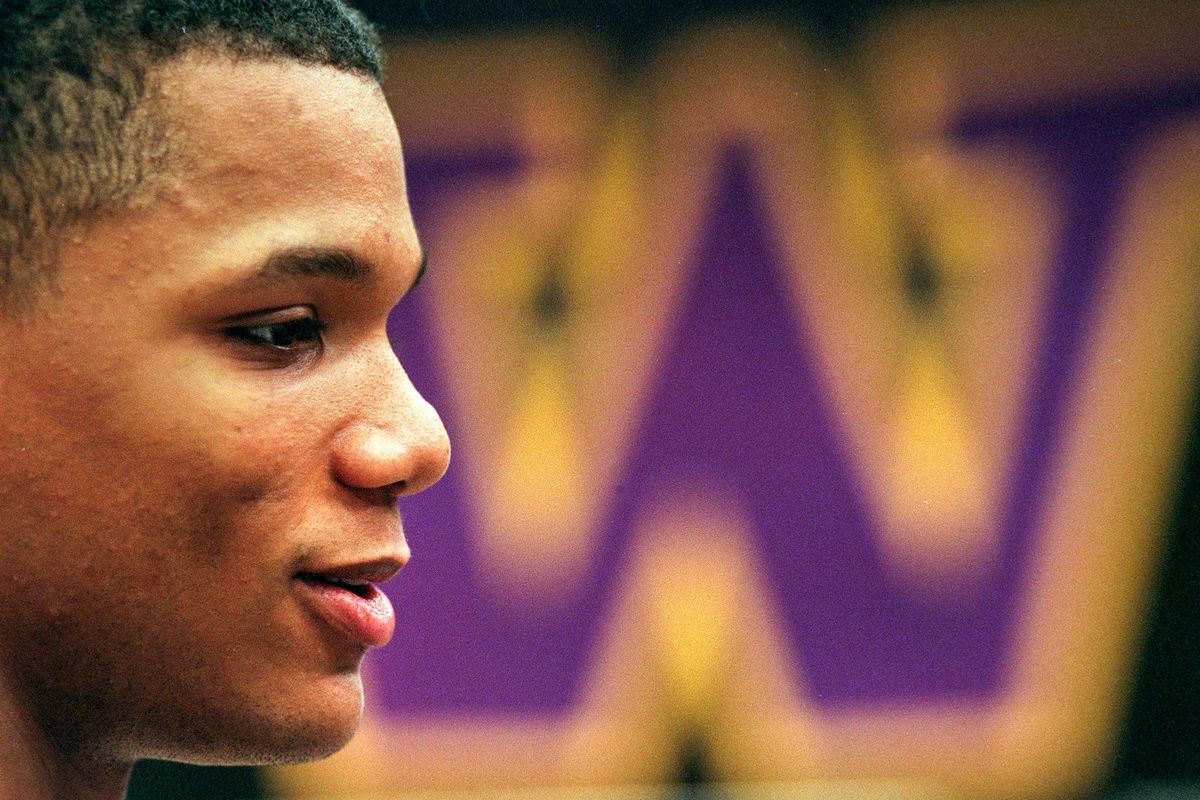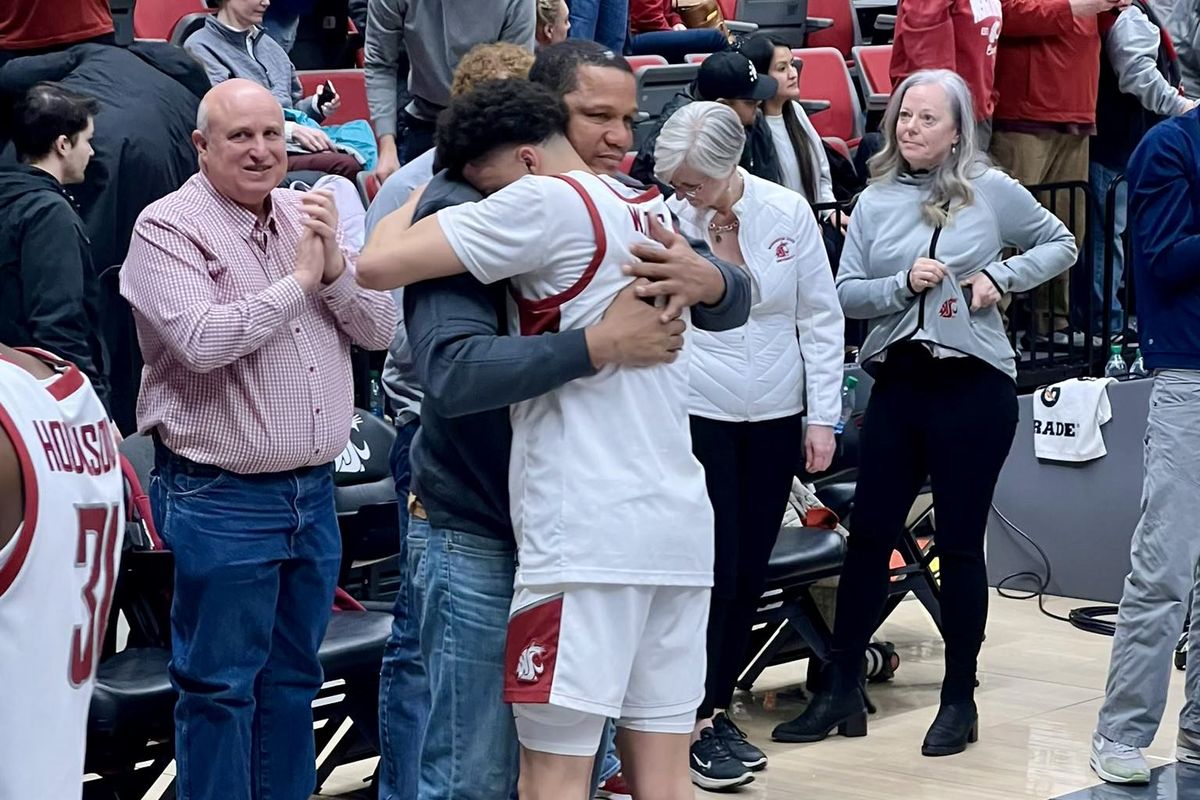Inside the relationship between Donald and Isaiah Watts, the WSU freshman bursting onto the scene
Washington State freshman Isaiah Watts embraces his father Donald after the Cougars’ Pac-12 Conference win over USC last Thursday in Pullman. (Courtesy of Donald Watts)
PULLMAN – Donald Watts strides through the doorway, ducking into a bustling Roost Cafe on Washington State basketball game day on Saturday morning, in many ways a changed man.
As he makes his way through the cafe, coffee machines whirring and students making conversation and a small golden retriever looking up to see who this 6-foot-4 man is, Watts knows there’s a lot different about this situation. For one, he finds himself in Pullman, nearly 300 miles away from Seattle – where he’s from, where he lives, where he became a star Washington guard in the late 1990s, where he raised his son, 19-year-old Isaiah, now a true freshman guard for the Cougars.
For that reason, he has traded UW purple for WSU crimson, sporting a jacket with the Cougar logo in the top-left corner. Watts folds himself into a chair, setting down his laptop on the table and opening it, pondering whether he should extend his stay at the Residence Inn by a night. Or should he drive back to Seattle, a roughly 4½-hour journey, after the game?
Watts feels fortunate to have the opportunity to decide on his own. That’s another thing that has changed for him recently: He has finally regained enough strength in his arms and legs, which failed him when he suffered a stroke on Christmas Day, to drive himself around. Now when he drives to Pullman on weekends, to watch Isaiah play and train him on the off-days, he can do so without help.
“I like that drive. This time over here, I went the whole way without listening to the radio,” Watts said. “Just thoughts, just processing, just meditating.”
Lately, Watts has had lots to meditate on: Isaiah’s emergence, scoring a career-high 18 points the day prior in a win over USC. The condition of his father, ex-Seattle Supersonics star Slick Watts, who suffered a stroke in 2021, this one much more debilitating. Even his own recovery, getting back on his feet barely a week after his stroke, making his way to Pullman for WSU’s home game against Oregon in early January.
These days, Watts has two full-time jobs: Taking care of his father, whose entire left side is paralyzed and who can only talk in a few words, plus operating his basketball training academy. That’s where, ahead of WSU’s road matchup with Washington in early February, Isaiah and teammate Jaylen Wells went to practice, Donald helping Wells polish the midrange jumper he used to bury the Huskies in crunch time.
Watts has continued working with those two, especially when he comes to Pullman for WSU games. The three will head to Beasley Coliseum – or sometimes the team’s practice gym, right across the street – and Donald will pass on tips. He’ll have Isaiah rock into a catch-and-shoot 3-pointer. He’ll have Wells dribble into a 15-footer. Then he’ll show Isaiah the footwork he needs to sidestep into a 16-foot jumper.

Ahead of 18th-ranked Washington State’s regular-season finale, a home matchup with Washington on Thursday night, the changes are hitting Donald. Come tipoff, he won’t be pulling for the Huskies the way he will be for the Cougs, who are enjoying their best season in more than a decade. They’re a lock for the NCAA Tournament, which they haven’t reached since 2008, and Isaiah has earned meaningful playing time lately, unlocking his team’s offense with the jump shot the two have worked on tirelessly.
If it seems like Watts has recovered quickly, that’s because he has. Not two weeks passed between the day he suffered his stroke and the day he made back to Pullman to watch the Cougars’ home game against the Ducks, still their only home loss this season, doing so with the help of a friend.
The inspiration Watts draws to make such a fast recovery comes from his only son.
“It’s just his energy. His relentless, positive energy,” Watts says of Isaiah. “I really love the man he’s growing into. I’m really proud of how he’s handling himself, his situation, the teammate that he is, beyond the experience of Thursday. I’m just super proud.”
As Isaiah has watched his dad get back on his feet, he feels the same way, partially because he’s impressed with his progress – and partially because he remembers finding out about the news in the first place.
***
Back home in Seattle, Isaiah was headed over to his dad’s house for a Christmas meal, ready to meet up with his loved ones during the holiday break. That’s about when he got a phone call from his sister Jadyn, who told Isaiah he needed to get to the hospital.
“You gotta come to the ER,” Jadyn said.
“I was like, dang,” Isaiah said. “I didn’t wanna think the worst, but obviously you think the worst, you know?”
The worst had come to fruition. Roughly an hour prior, Donald was out getting groceries to cook for his family, when he stopped at a Starbucks to use the restroom. He turned his car off, got out and turned around to grab his keys off the seat. He tried to reach out with his left hand – but it didn’t move.
So Watts used his right hand to grab his keys. He used the same hand to close the door, but when he swung it closed, he nearly shut his arm in the car door.
“I was like, ‘What the hell is that?’ ” Donald said.
Still confused, Donald walked inside and entered the men’s room. As he was finishing up, he went to wash up, trying to use his left hand. Instead, his hand dropped to the floor.
“I was like, ‘Oh, shoot,’ ” Donald said. “And then I could feel my legs getting weak. Then I’m like, ‘I’m locked in the bathroom.’ I’m like, ‘Oh, man. I got up.’ I’m pulling my pants up with one leg and I got out the door.”
Eventually, Donald enlisted the help of a customer, who helped him call 911. The ambulance arrived relatively quickly, he remembers – “I don’t know what the time was when you’re going through stuff like that,” he said – but by the time it did, he couldn’t walk.
At the hospital, doctors helped Donald understand what he already suspected could have led to such an episode. He was under tons of stress, mostly from taking care of his father, whose wife deals with mental health challenges that make her “a potential danger and a risk to him,” Donald said, explaining why his father now lives with him.
That led the Watts to court, where Donald’s attorney “agreed to something I didn’t agree to,” he said, which was going to put Donald in a financial bind from which he wouldn’t be able to recover. Over a longer legal process, Donald’s blood pressure rose, and eventually, he had a brain bleed. That’s what caused his stroke.
“All that pressure snowballed,” Donald said.
“It’s a lot of stuff that he has to deal with at home,” Isaiah added.

As he works to recover to full health, Donald has set milestones for himself. In his first week allowed to walk unsupervised, he completed a set of “lines” – basically up and down the court, turning around at increasing intervals like the free-throw line, 3-point line – in 1 minute, 28 seconds. After two weeks, 48 seconds. After three, 38 seconds. His goal is to reach 30 seconds.
He also works with a jump rope, slowly regaining strength in his arms and legs, enough to complete basketball skills like making a left-handed layup. He isn’t back to 100% strength, but he’s close.
It has set into motion the world Donald now inhabits, where he balances three occupations: Taking care of his father, working as a basketball skills trainer and traveling to watch Isaiah and the Cougs, projected as a No. 5 or 6 seed for the NCAA Tournament. Their latest wins came last weekend over USC and UCLA, against whom Isaiah combined for 24 points, including a key 18 against the Bruins.
In a career game, the kind father and son always envisioned together, Isaiah could barely miss. He connected on 5 of 6 3-pointers. With his last one, he gave WSU its first lead, a catch-and-shoot basket that sent a shockwave through Beasley Coliseum’s crowd. The Cougars never relinquished the lead, erasing a double-digit deficit.
“The way it just hit my hands – and this is (nothing) cocky, confident – the way it hit my hands was just so perfect,” Isaiah said after the game. “It was just like, it kind of had to go up. So yeah, I really couldn’t tell you what really went on. But I just knew that I had to shoot it.”
After the Trojans missed a couple of shots to tie the game and the buzzer sounded, Donald rose from his courtside seat and met Isaiah. The two shared a long embrace on the court, the gravity of the moment hitting them like a tidal wave. It reminded Isaiah of the work it took, of the hours he spent with his dad working on the same types of shots that he had just used to beat USC, a team he grew up watching on TV.
“Just to have a game like that against a team like that, it was just a lot for me,” Isaiah said. “So I just hugged him and cried. He was crying, too. I’ve never really seen him cry like that. So it meant a lot.”

“It was amazing. It was an incredible feeling,” Donald said. “I’ve had some great times as a player. You definitely miss those times and you never get them back. But then you know the work that it takes. You know the patience that it takes. You know the dedication and you also know the joy. So to be in these moments – not just that moment, but all the moments leading up to it – it’s just as incredible, or probably even more than doing it as a player.”
It’s the kind of moment, Donald says, you can only appreciate if you know the full story.
***
Donald could recognize the look on Isaiah’s face a mile away. He had just walked into his son’s bedroom, where Isaiah wore a blank stare, looking at the wall. He looked glum, like the reality that his junior season of high school ball was getting taken away by the coronavirus pandemic was beginning to set in.
Moreover, Isaiah wasn’t seeing the fruits of his labor, wasn’t getting the offers he expected as a standout guard at West Seattle.
“Man, Dad, I just haven’t had the positive outcome from all the work that I’ve done,” Isaiah said. “I’m not really feeling this. I’m not sure if it’s worth it.”
Donald sat on Isaiah’s bed. He brought up the same lesson he knew Isaiah would roll his eyes at, the same one he had imparted dozens of times: Every player who has been a great player has gotten over what you’re going through right now.
Isaiah was in a tricky spot, and not one to which his friends or teammates could relate. He didn’t feel pressure to match the careers his grandfather and father authored – “My grandpa taught me at a young age that you play for you, you don’t play for your name,” Isaiah said – but he did feel like his dad’s perspective wasn’t helping.
Donald, though, has always fashioned himself a parent who lets his kids “bump their heads,” in his own words. He doesn’t want to use his sway in any way, especially not to convince a college coach to give his son a shot just because he’s his son. The telling part was that he never had the chance.
“I didn’t do that in our recruiting process,” Donald said. “They ain’t calling me. They know me. You ain’t ready. Like, my phone ain’t ringing. People on Instagram are telling you that you’re the one, and you’re this, this and this. But you told me you wanna be a high-major basketball player. I know tons of high-major coaches, and my phone’s not ringing. So what are we doing?”
So father and son generated opportunity where there was none. For his senior year of high school ball, Isaiah did a prep year at South Kent School in Connecticut, a boarding school that has produced NBA players such as Seattle native Isaiah Thomas, Dion Waiters and Andre Blatche. In one game, though, disaster struck.
South Kent was up 30 late in one game. Isaiah tried to take a charge. He suffered a wrist injury that ended his season. As a result, the school he was committed to, Seton Hall, didn’t show Isaiah the reassurance he wanted.
“They didn’t really keep a lot of the same energy,” he said. “So I knew as soon as I got healthy, playing in open gyms and then playing in front of coaches, that’s what I would have to do.”
That’s where WSU coach Kyle Smith jumped into action. He had already offered Isaiah, but when he announced that he was decommitting from Seton Hall, Smith placed one of the first calls to Isaiah, telling him he would be flying out to see him play in an open gym.
When he did, Smith didn’t see Isaiah play lights-out. His shot wasn’t falling, Isaiah said. He nabbed a couple of steals, but not many other highlights. “I had a rough day,” he said, “but he obviously liked what he saw.”
“I told him, ‘Let’s get this done,’ right after the open gym,” Isaiah said.
A few days later, Smith sent Isaiah an official scholarship offer. He accepted. Less than a year later, he has capitalized in the biggest of ways, flourishing as a spark plug for a Washington State team bound for its first NCAA Tournament since Isaiah was a toddler.
He’s making his dad proud. Not because of the results he’s delivering on the court, but because of the way he worked to put himself in the position to do so, because of the way he is himself: The competitive, stubborn young man whose energy has fueled his dad’s recovery.
“That’s why I was never really too worried – because my dad is just hard-headed as can be,” Isaiah said. “I’m his son, for sure.”



